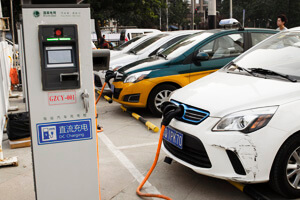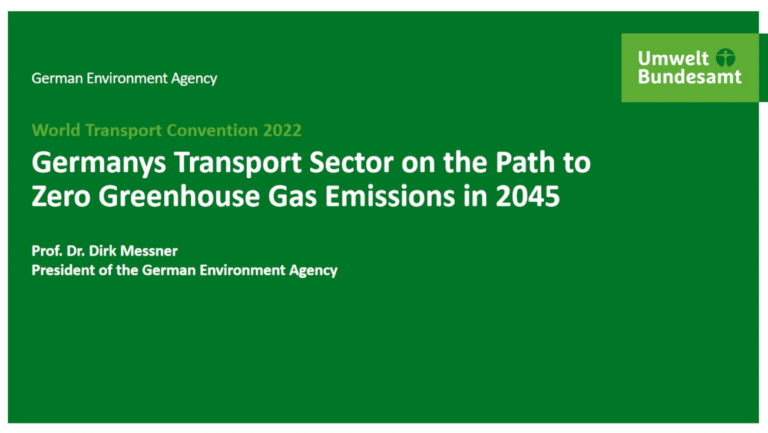In the last year China has witnessed an unprecedented growth in the electric vehicle market. In 2015 alone Chinese customers purchased three times more electric vehicles than in the previous year. With unit sales of 188.000 electric vehicles China has surpassed the United States of America as a leading market for electric cars. Germany and China continue to work in the fields of climate–friendly market development, standardisation, and charging infrastructure.
The reasons for China’s current success in promoting e-mobility are manifold. An ambitious vehicle manufacturing industry, a highly supportive fiscal (e.g. purchase subsidies) and regulatory policy environment (e.g. exemption from vehicle quotas in cities), charging infrastructure investments as well as public and private cooperation are certainly contributing to the rapid market growth. To enhance the latter, the China Committee of Electric Vehicles 100 Members (known as China EV100) was founded in 2014. The China EV100 is an associated organisation dedicated to advancing research, market development, and deployment of electric vehicles in China. Under the chairmanship of Chen Qingtai (Former Deputy Director of State Council Development Research Center) and Feng Fei (Vice Minister of Industry and Information Technology of China), the advisory board gathered more than 100 high-ranking representatives from different ministries, government departments, academia, as well as research institutions and industries in the field of electric vehicles in China.
An International Advisory Board for the China EV100 was established with the aim of fostering international exchange and cooperation in terms of policy making and best practice sharing. As a member of the International Advisory Board, GIZ supports China EV100 with its technical expertise and international cooperation networks with a focus on a climate friendly market development.
The 2nd Annual Forum of China EV100 was successfully held on 23 – 24 January 2016 at Diaoyutai State Guest House in Beijing. This year’s forum theme was “Building a Competitive, Innovative and Sustainable Ecology”. Decision makers from national and local government bodies, senior leaders from the leading think tanks and relevant industries, and well-known experts from research institutes gathered together to discuss development strategies, policies, a technological roadmap and the future market development of electric vehicles in China.
Following the theme of the forum, “Competitiveness, Innovation and Sustainability”, subsequent discussions in plenary and break-away sessions focused on the question of how to balance the policy instruments and the market mechanisms in order to encourage innovation while creating a fair and competitive market environment. The following key points were discussed:
1. Phase-out of direct financial subsidies for electric vehicles
With its annual production volume of over 270,000 NEVs (plug-in hybrids, battery electric vehicles and fuel cell vehicles) in 2015, China ranks on top of the international markets. However, the high subsidies, which were key to kick-off the market development, continue to burden national and local government budgets. Consequently, China is considering to gradually phase out the subsidy scheme starting from 2016. The Ministry of Finance plans to completely end direct purchasing subsidies as of 2021.
2. Establishment of a NEV Credit System
Similar to the Zero-Emission-Vehicle Mandate in California, China is discussing the design of a NEV Credit Regulation. Mandatory quota of NEV sales could be set for all automobile manufacturers in China. By exceeding the mandatory number of NEV sales manufacturers may earn credits to be sold to manufacturers who fail to reach their NEV sales targets. Whether the NEV Credit Regulation should be linked with the China Corporate Average Fuel Consumption regulation is one of the key issues in the current discussion.
3. Elimination of local protectionism
Cities like Beijing, Shenzhen and Shanghai have shown that the development of citywide charging infrastructure, local promotional policies, and market access at a municipal level are drivers for a nationwide market uptake. However, some cities focused on the investment in and protection of local NEV products. This has hindered competition and sustainable national market development. It was agreed that unified standards and promotional criteria in terms of market access conditions for electric vehicles are required. In 2014 the State Council had already signaled to eliminate these local barriers.
4. Open market entry conditions for newcomers
New market players and disruptive innovations by companies beyond the traditional vehicle manufacturers are characterising the New Energy Vehicle market worldwide. Information technology companies, battery producers, and other related suppliers are vital for an innovative and dynamic electric vehicle industry. The China EV100 recommends that an un-bureaucratic market access should be provided for “newcomers” who are willing to take part in this cross-sector industrial chain.
5. Improvement of the interoperability of charging infrastructures for electric vehicles
Important industry standards for vehicle charging interfaces have been finalised in the last year. However, interoperability between different charging infrastructure operators and electric vehicles remains a challenge. The responsible authorities, standardisation institutes as well as companies pledged to work together to ensure the interoperability of the charging network. Several standards that define the technical specifications are currently being developed and will be published in 2016.
6. Development of a long-term and stable policy environment
As one of the most strategic new industries that China is currently promoting, e-mobility requires comprehensive and long-term planning. The experience from the NEV demonstration programme shows that short-term policies with differentiation between a national and local level cause uncertainty and skews investment decisions. It is therefore vital to develop a long-term and sustainable policy framework that encourages the industry to focus on its own strategy and product planning.
GIZ is supporting the China EV100 within the framework of the Sino-German Cooperation Project on Electro-Mobility and Climate protection financed through the International Climate Initiative by the German Federal Ministry for the Environment.





